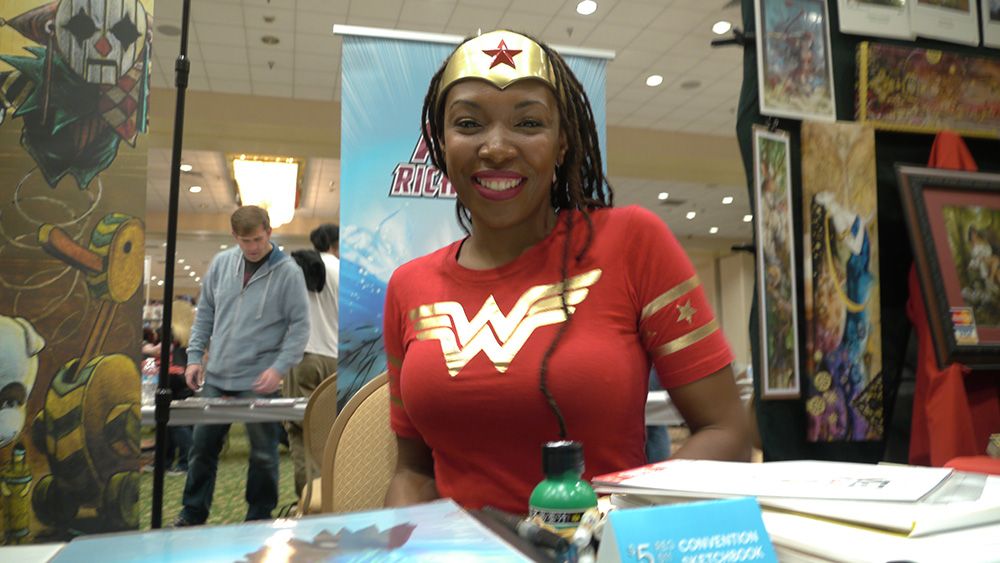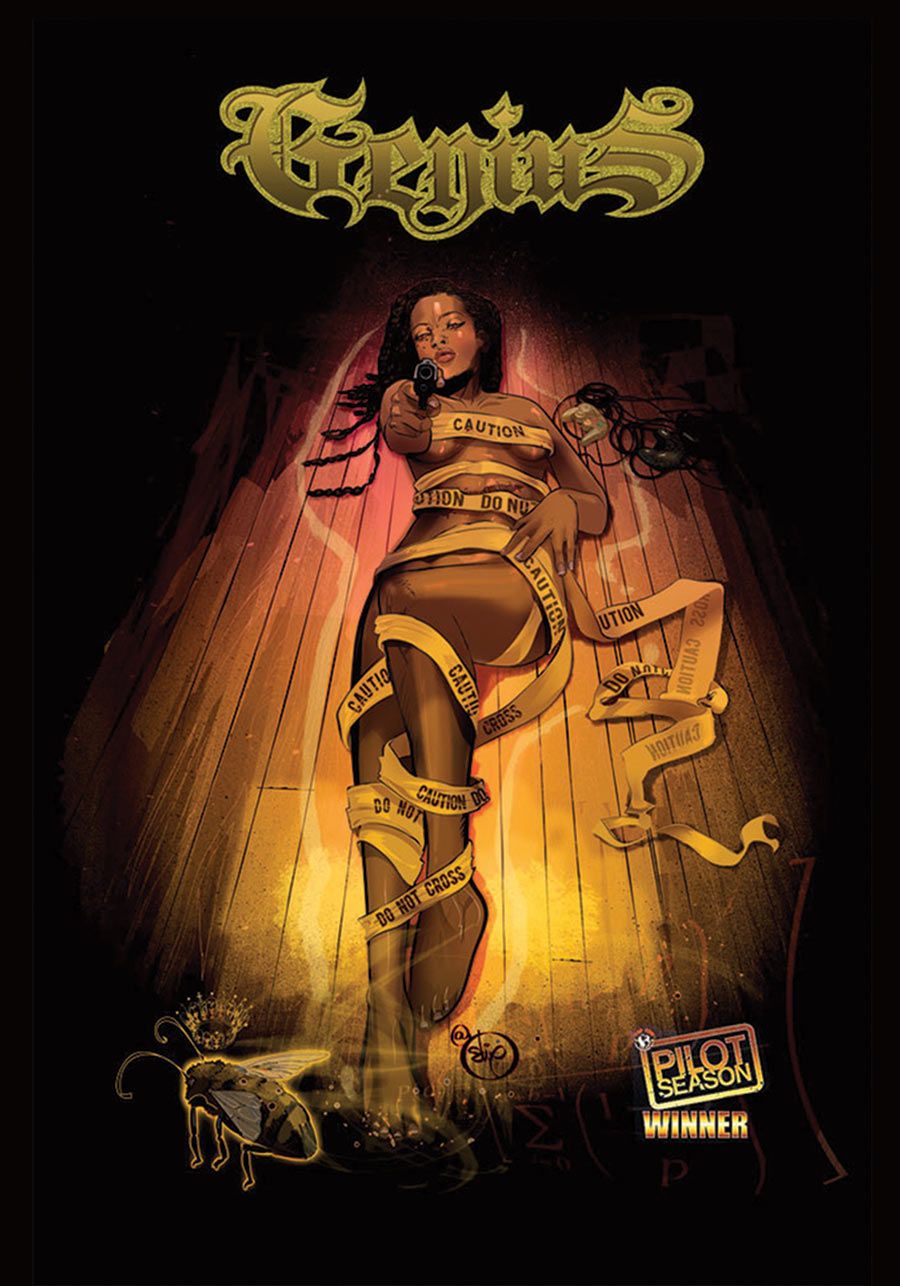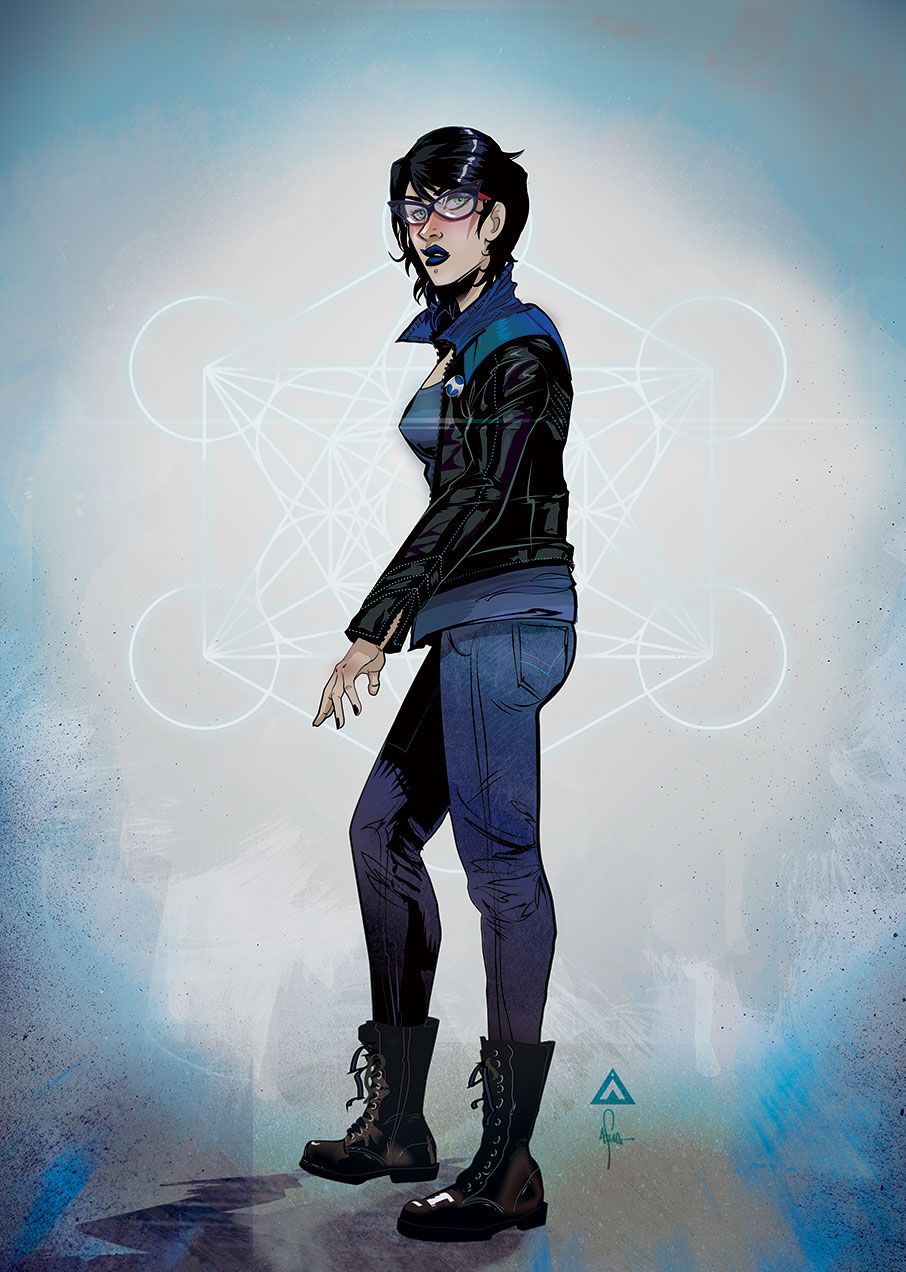THE COLOR BARRIER is a month-long "magazine" spotlighting discussions on diversity in comic books, graphic novels, and popular culture.
The interviews, profiles, and subject matter featured will focus on men and women whose accomplishments serve to create a more informative and culturally diverse landscape of entertainment.
Artist Afua Richardson, aka Docta Foo, aka Lakota Sioux, is best known in the comic book realm for her Top Cow Pilot Season winning series "Genius," co-created with writers Marc Bernardin and Adam Freeman. But beyond the world of comics, she is an accomplished musician and graphic designer. In the latest installment of THE COLOR BARRIER, she discusses the issue of identity, and how it's expressed through her various artistic pursuits.
Joseph Phillip Illidge: Superhero universes are held together by the idea of secret identities, but you have chosen the entertainer approach of multiple public identities. How are Afua Richardson, Docta Foo and Lakota Sioux different, and what unites them?
Afua Richardson: Ever since I was pint-sized, I've wanted a secret identity. I've wanted to hide away some element of my personality that is extraordinary and heroic, to be capable of doing something, but not bear the burden of being in the public eye. I love the idea of pen names and aliases; people can remove their assumptions about what they think someone named Afua would make. They'd just look at the work and judge it for what it is or what it isn't.
Lakota Sioux was my androgynous alias whilst I was a musician and simultaneously wrote and drew sci-fi erotica. Terrible, amateurish, grammatical Godzilla-stomping laser alien, college humor, faux-anime erotica. But also, as a young artist aspiring to be a professional, I wanted critiques that weren't patronizing. Afua received, "Oh, that's pretty good." Lakota received, "This is great, but you might want to reconsider your proportions and place a grid down when you're doing your perspective."
It might have something to do with the nature of my name, and the fact that I didn't know Afua was my first name until I was 5 or 6. Prior to that, I went by my middle name. Afua, in West African traditions, is a name given to a girl born on Friday. Then, 7 days later, if you are meant to be of this world, you'll receive an actual name. Knowing I had a secret name was an exciting thought to a toddler. I suppose that excitement never left. As I changed, my aliases changed with me. Lakota was very meek and rather passive. Docta Foo is more of a cheerful, approachable, and hopefully helpful spirit who aims to cure people of the ails of society by helping them marry the left and right hemispheres of their minds.
Art cures, in other words.
Do you spend equal amounts of time in the music and visual art worlds and industries?
Art takes precedence at the moment. It's very time consuming for me. I need to focus more to do it. One of my goals is to be a faster creator, but that will come once I've set up a studio and drawing table -- I'm looking for a new home at the moment. Music is something I've been trained to do most of my life, where art is something I've taught myself to do. So art wise, I'm still learning and occasionally making rookie mistakes that I'm thankful my colleagues keep me accountable for.
I've created a group on Facebook that I eventually hope to make a forum on my website called Docta Foo's Lab for that very reason. I wanted to have a place where professionals and artists, or even art appreciators and hobbyists, can comfortably post art and get critiqued or simply post things they found that helped them. Just to keep me on my toes.
Music, I can comfortably spend an hour or two composingand come out with something I'm satisfied with. Maybe not always a masterpiece, but I'm fine with that. It's not my job at the moment other than occasional voice acting. So there is not as much pressure to create for someone else.
It's actually a reversal of my life before the age of 25. It was a three-year transition into doing comics and graphic design full time. Something I never really thought was a possibility. But life takes you to amazing places, sometimes.
From what I know about the Top Cow series, "Genius" by you and writers Marc Bernardin and Adam Freeman, it's a great idea with socio-economic themes, the premise of the next great warrior leader of our time being a young Black girl from the hood. Is "Genius" a story you felt you had to do, without question?
Something about the story resonated with me. As I started to create it, elements in the story started to happen to me in real life. Perhaps not exploding cars and gang shootouts orchestrated by a military genius, but more of the activism aspect.
I became involved in various groups, paying attention to how my life was being governed by people who don't have my best interest at heart. I started to realize that by just drawing this book, I'd be able to assist in changing the minds of people by using the medium of fiction to express some of the things I've seen. Even though I didn't write it, I felt like I was drawing a metaphor for my life.
Your song "Starchild," with collaborator Alexa Edmonds Lima, is a story of identity and origins. Are those themes present throughout your various artistic works and endeavors?
History is often written by the victors. So one's origin story can be subject to change depending on who is telling the story. As technology advances, we're coming to the realization that human civilizations are much older than we think they are. I think it's important for people to understand how magnificent life on this planet is. The advancement of people, the science hidden in oral traditions and myth is still being uncovered.
When I create, I don't particularly set an intention before doing so unless it's for a client. It's as if I turn myself into a radio receiver and let the song use me as a vessel to be born. It's already there and I have to tune the dial to hear it clearly and edit the parts that don't make sense.
It's easy for rumors to start and spread about you drawing the X-Men's Storm character for Marvel Comics, so let's go in the opposite direction. Which popular Caucasian male character, published by Marvel or DC Comics, would you like to illustrate in a story?
Hmm -- I'd have to say Beast or Nightcrawler. Those characters are psychologically complex, and conflicted with their outward appearance causing them to be secluded. It would be fun to artistically walk in their shoes for a while. I've loved them since I was about 9 years old. Maybe I'm biased, because I love that color blue. Sometimes it's as simple as that. Nightcrawler seems to have this tortured religious overtone to his persona. It would be fun to delve into the occult with that sort of setting in mind.
It's apparent from your multi-layered business that you don't need comic books, but you navigate within that world. What is it about the comic book language that attracts you to use it as a vehicle for your art?
I was a tomboy. Ran fast, punched hard, threw far, loved comics and video games. I hung out with guys more than gals and saw myself in heroes more than princesses and frilly archetypes. I'm also enthralled by the esoteric and ancient myth. I see amazing parallels in the heroes of the day and the myths of old. Grant Morrison, in his book "Supergods," describes the heroes of the day as the new gods. When you think about what the gods represented, you can see why they remained so pertinent in the minds of people.
Randall Carlson of Sacred Geometry International describes the gods as metaphors for ratios, relationships in nature, and the planets (i.e Jupiter = Zeus throwing thunderbolts or comets towards or away from the earth, Pluto = Hades etc). These things help us remember the archetypes in us, and the nature of our universe. As I read comics, which I think is a very unique form of literature, I find resolutions vicariously through the pages of the protagonist's life.
Your website is an impressive display of skill set diversity and presentation. How has that helped your career and distinguish you from the crowd?
I've had a lot of ups and downs in my life. It's helped me to become resourceful. I needed a job, but didn't really know how to use a computer, so I hung out with people who did know until I learned enough from them. Once I got a little desk job at a music store, I learned how to use Photoshop on my lunch breaks. I sort of vine swung my way from skill to skill out of necessity. Many times, in a pool of professional musicians, I was the only graphic designer or illustrator they knew personally. So it was an easy way for me to get paid to learn.
How do you get yourself into an artistic generator mode?
It really depends on what I'm creating. If I'm making music, I'll drink tea and take a walk. Let the sounds make their way into my head. If I'm about to draw, I make a playlist to fit the mode of what I'll be illustrating. It's like making a soundtrack to the movie in your mind.
Do you have a mantra? Can you share it?
Mastery of Art is mastery of self.
I want to take in the Trivium method of learning, and the Quadrivium as well. Pythagoreans considered arithmetic as the study of number. Music is Math in time. Geometry is math in space.
People think that one cannot be artistic and scientific, but the greats were polymaths and incorporated both into their works. I'm no master. The visions in my head, I'm not skilled enough to properly represent. But I think that's a good thing.
The dangling carrot will push me forward, and hopefully these methods will ensure I head in that direction, or whatever direction my life has in store for me.





